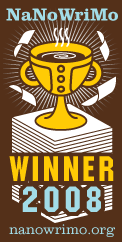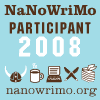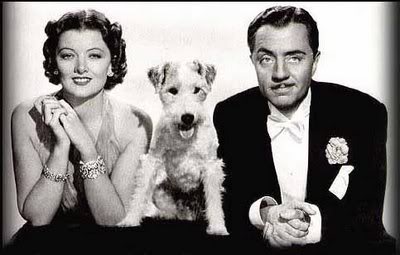
I've learned a lot from NaNoWriMo. The main thing I've learned is to be quick and dirty.
Anything to get that first draft in.
I think what's held me up in the past is an obsession with perfecting as I write. For a short story or poem, this can sometimes work. For a novel, it was bogging me down and hurting my brain.
I would decided to change one thing, say, the year the story takes place, or the color of my main character's eyes (no, really! I did this), and I would feel compelled to go back through what I'd written so far, making all those changes before I could move on.
Now I've come to realize that it's more important just to
tell the story.
Get it out there, and then go back and polish. I've been using the
"Comments" function in Microsoft Word to help me out there. A text-file list or a sticky note on your desk would work just as well.
Whenever I decide that I screwed something up that happened earlier, or that I should shoehorn another event into the narrative, I make a comment to myself, such as: "Change character's name to sound less like main character's."
Voila! No time wasted pondering names. I can continue to use my rough-draft name throughout this first go, and after I'm done with the important part -- the
story -- I can start flipping through phone books and baby-name books and getting bogged down in the editing side of things. If I do all that now, it will derail my train of thought, and the story will never get told.
This works for small things like characters' names and eye colors, and for big things like "Make Ann be a blackmailer" or "Add tension between Joe and Betty" or (true story) "Change it to first person." In that last case, I just kept going with the first person from there on out, resolving to edit my first pages to match at the end.
I also, when stuck at a particular word or phrase, instead of wasting time haring off through the thesaurus, just bracket it and, if necesary, add descriptors that make it into one long word indicating "Fix this later." For instance, I have brackets around such things as [LastNameHere] and [DifferentWordForSaid] and [SomethingLikeSmelly] and [HospitalName]. (I didn't want to unfairly inflate my word count by making those into separate words.)
It doesn't matter if it's messy and ugly. This is not my final draft. No one has to see this draft. It is not going out for immediate publishing. I have time to edit...but
later!

I'm not promising to continue to write at the breakneck pace of 50,000 words a month, but I will take this little tidbit of oh-duh advice with me when I return to my first novel.
I will write, I will tell the story, and I will finish a first draft! Be it purely awful or pure gold (or
purest green, which is maybe somewhere in between), I will finally have a complete story arc, and something to edit.
P.S. I think I need to think of first drafts of novels more like blog posts... Sorry to all my blog readers who now know what quality I put into my blog posts!
Perfect illustration of speed-typing hands courtesy of Kriss Szkurlatowski from stock.xchng
 I have officially finished one full novel and won NaNoWriMo08!
I have officially finished one full novel and won NaNoWriMo08!


 Back during the first season of Survivor, there was an endurance test toward the end where the remaining contestants had to keep their hand on a pole. That was the only rule. One of the contestants, good old Rudy, absentmindedly removed his hand from the pole to scracth his nose or something, and then tried to play it off, but was deservedly disqualified.
Back during the first season of Survivor, there was an endurance test toward the end where the remaining contestants had to keep their hand on a pole. That was the only rule. One of the contestants, good old Rudy, absentmindedly removed his hand from the pole to scracth his nose or something, and then tried to play it off, but was deservedly disqualified.








